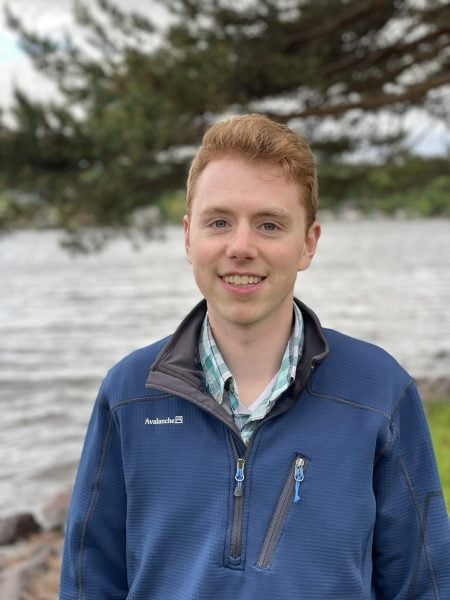Having nearly completed two years of service as a Peace Corps Volunteer in Liberia, West Africa, I spent one sweltering afternoon in Spring of 2019 looking forward to what came next for me. Prior to service I had completed my bachelor’s degree in geology at the University of South Florida, researching igneous and metamorphic geochemistry of the smoky mountains. I knew two things about what I wanted from the next chapter of my life that afternoon: I wanted a change of climate and a chance to study unique and fascinating geology.
Fast forward to now, where I am working on my Ph.D. in geophysics, studying rock magnetism and paleomagnetism. I have gotten to know the Precambrian geology of the Keweeenaw intimately through researching the history of intrusive igneous dikes that criss-cross the landscape from Marquette to Copper Harbor, and from researching the depositional environments that created some of the largest iron formations in the world down near Iron Mountain. I’ve even been able to go beyond the Keweenaw and study magnetic alloys in meteorites, using the most powerful microscopy methods known to look at how these unique metals form in space and are deformed by entering the Earth’s atmosphere. I am indebted to the Geological and Engineering Mining Sciences department for the opportunity to research and study these topics. I am especially grateful to my advisor Dr. Aleksey Smirnov and my committee members Dr. James Degraff and Dr. Gregory Waite for providing me with guidance and sharing in their knowledge. I hope to repay the debt by teaching a new generation about the dynamic land they stand on.
During my time at Tech, I have also been fortunate enough to continue my engagement in climate science and education, something I have been pursuing since I was a teenager making oyster matts to combat eutrophication in Florida’s Indian River Lagoon. Thanks to the gracious support and guidance of Dr. Sarah Green from the department of chemistry and Dr. Leah Dundon from the Vanderbilt University School of Engineering, I have been able to help teach a multi-university class on climate science and policy as well as participate in the United Nations Framework Convention on Climate Change’s Conference of the Parties. I look forward to engaging with the climate policy and science network I have built up in my future career as an educator, my way of helping to sustain all Earth sciences for generations to come.
Sponsored by the King-Chavez-Parks Future Faculty Fellowship from the State of Michigan.

